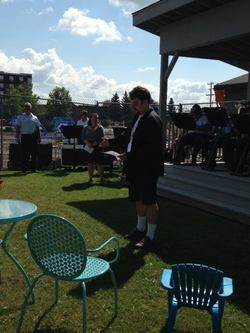It's not often anyone is able to write something for the stage. Rarer still are any of us allowed to personally direct the plays we write.
Some time back, I attended a performance at our local theatre, The Grande Parlour in Cold lake. I don't know how long the urge had been burning inside me, but I suddenly thought I could see a direct line between fingers on a keyboard and actors speaking lines to one another, playing whatever game the playwright invents. After the performance, I went up to Teresa Pettit and asked her if there were any opportunities to contribute material to the theatre. The next summer, there was a program where people from the community could write and direct their own short plays, and I did it, and did it again next year. An extraordinary dream, which now seems to be coming to an end.
The Grande Parlour Theatre was opened a few years ago beside Beantrees, our local coffee shop. The owner of Beantrees contributed a great deal of time and money, building sets, paying rent, doing all the other invisible things that keep a theatre running. Teresa lost a great deal of sleep putting together productions, writing and directing, as well as guiding fumbling amateurs like me. In return, the community has gotten murder mysteries, hard-hitting dramas, comedies, musicals, science fiction and all manner of other plays. Many sacrificed many things to give the town a theatre, and they asked only that the public come, and enjoy.
But there comes an end to such sacrifice. Eventually, there is no more left to give. The town gave grants, but that still leaves the astronomical rent demanded for main street real estate. Now the ship has beached on the shore, and it looks as if she may never sail again.
There's a real selfish component to the sorrow I feel. At the same time, I know there are many worse off than me, that soon may have no creative outlet at all. There are many who crave social interaction, and find themselves with no place to go in the evening besides a bar. How much better to sit together in one place, and watch as a group of people pretends to be another group of people! How much better is a town that has a theatre, a cooperative experiment that makes the public feel the joys and sufferings of others!
To fund an artistic venture can, I imagine, feel like scooping money into a deep, dark hole. It can only be done through love, the same love that moves directors, set decorators, stage managers, writers and all the others to band together and create something unique. I don't know if there is anyone out there who feels as I do, and has enough time and money to make it happen.
I do not like the idea of living in a place where industry is all there is. I do not like the attitude that views the arts as having no value, and I do not care to live in a town that feels that way. I don't know what might be required to make a theatre a going concern, but I do hope it happens. If not, then I salute the Grande Parlour Theatre, and the love behind it.
I've learned things from working there. I've learned what a portal the stage can be, suggesting worlds and universes beyond our own. I've learned the joy of seeing actors find new meanings in my words. I've learned that my own limitations are extraordinary. I've learned what a difference an experienced director makes. Excitement filled me every time I went down to the theatre. Many times, that excitement got in the way of the job at hand, but there was always somebody there to share it, to help direct its force into productive channels.
I almost feel the way a child must have felt, before there were wires and easy transportation, when a troupe of performers would come and set up their magical world at the edge of town.
They speak old words as though they're new,
They make new worlds in the evening air,
And the shadows of terrors, fantastic and true,
Are perfectly represented there.
Deftly they tumble, and juggle hot brands,
And speak of lives in the valleys beyond,
Then humbly they gather their coins from the stands,
Day comes, and they're gone.
Goodbye, Grande Parlour. Come back soon.
Some time back, I attended a performance at our local theatre, The Grande Parlour in Cold lake. I don't know how long the urge had been burning inside me, but I suddenly thought I could see a direct line between fingers on a keyboard and actors speaking lines to one another, playing whatever game the playwright invents. After the performance, I went up to Teresa Pettit and asked her if there were any opportunities to contribute material to the theatre. The next summer, there was a program where people from the community could write and direct their own short plays, and I did it, and did it again next year. An extraordinary dream, which now seems to be coming to an end.
The Grande Parlour Theatre was opened a few years ago beside Beantrees, our local coffee shop. The owner of Beantrees contributed a great deal of time and money, building sets, paying rent, doing all the other invisible things that keep a theatre running. Teresa lost a great deal of sleep putting together productions, writing and directing, as well as guiding fumbling amateurs like me. In return, the community has gotten murder mysteries, hard-hitting dramas, comedies, musicals, science fiction and all manner of other plays. Many sacrificed many things to give the town a theatre, and they asked only that the public come, and enjoy.
But there comes an end to such sacrifice. Eventually, there is no more left to give. The town gave grants, but that still leaves the astronomical rent demanded for main street real estate. Now the ship has beached on the shore, and it looks as if she may never sail again.
There's a real selfish component to the sorrow I feel. At the same time, I know there are many worse off than me, that soon may have no creative outlet at all. There are many who crave social interaction, and find themselves with no place to go in the evening besides a bar. How much better to sit together in one place, and watch as a group of people pretends to be another group of people! How much better is a town that has a theatre, a cooperative experiment that makes the public feel the joys and sufferings of others!
To fund an artistic venture can, I imagine, feel like scooping money into a deep, dark hole. It can only be done through love, the same love that moves directors, set decorators, stage managers, writers and all the others to band together and create something unique. I don't know if there is anyone out there who feels as I do, and has enough time and money to make it happen.
I do not like the idea of living in a place where industry is all there is. I do not like the attitude that views the arts as having no value, and I do not care to live in a town that feels that way. I don't know what might be required to make a theatre a going concern, but I do hope it happens. If not, then I salute the Grande Parlour Theatre, and the love behind it.
I've learned things from working there. I've learned what a portal the stage can be, suggesting worlds and universes beyond our own. I've learned the joy of seeing actors find new meanings in my words. I've learned that my own limitations are extraordinary. I've learned what a difference an experienced director makes. Excitement filled me every time I went down to the theatre. Many times, that excitement got in the way of the job at hand, but there was always somebody there to share it, to help direct its force into productive channels.
I almost feel the way a child must have felt, before there were wires and easy transportation, when a troupe of performers would come and set up their magical world at the edge of town.
They speak old words as though they're new,
They make new worlds in the evening air,
And the shadows of terrors, fantastic and true,
Are perfectly represented there.
Deftly they tumble, and juggle hot brands,
And speak of lives in the valleys beyond,
Then humbly they gather their coins from the stands,
Day comes, and they're gone.
Goodbye, Grande Parlour. Come back soon.



 RSS Feed
RSS Feed
